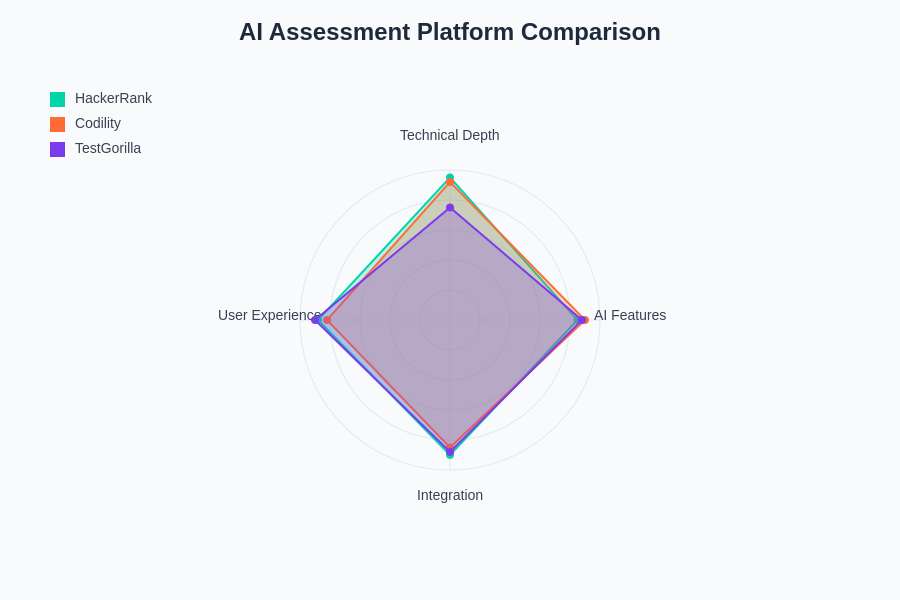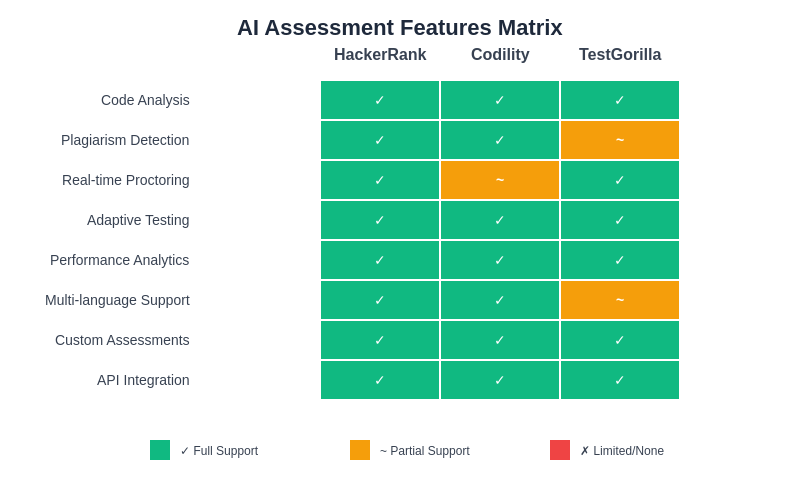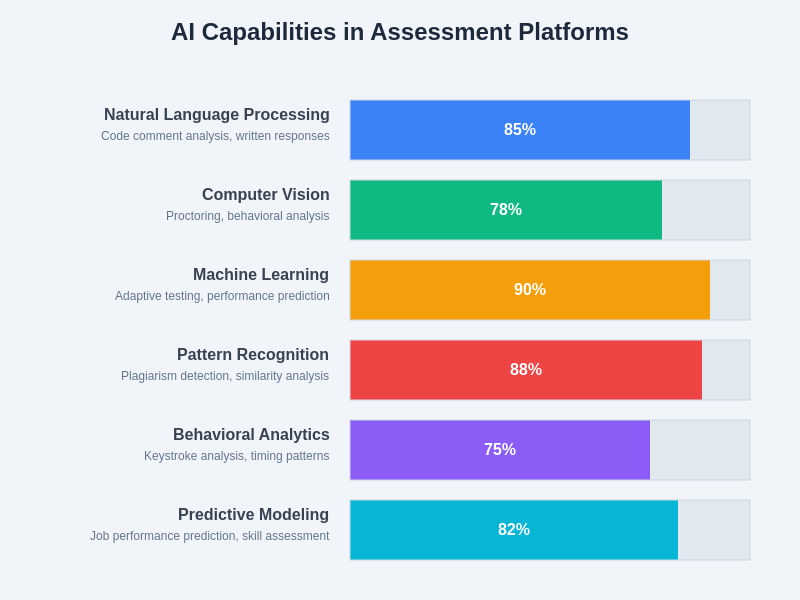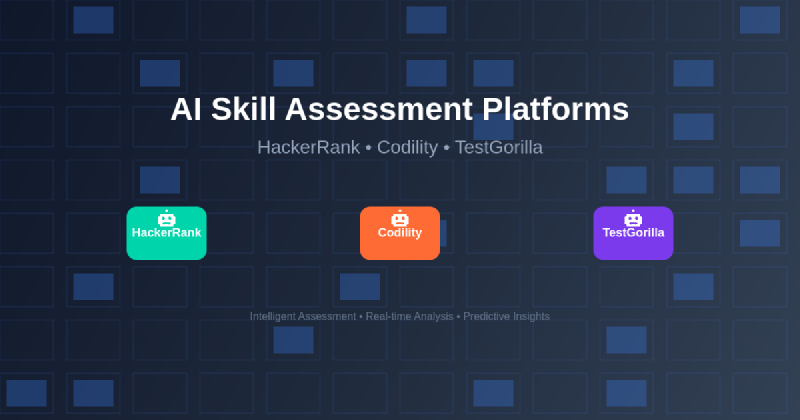The evolution of talent assessment in the digital age has witnessed a remarkable transformation through the integration of artificial intelligence technologies, fundamentally reshaping how organizations evaluate technical skills and cognitive abilities of potential candidates. Modern AI-powered assessment platforms have emerged as sophisticated solutions that go beyond traditional testing methodologies, offering dynamic, adaptive, and comprehensive evaluation frameworks that provide deeper insights into candidate capabilities while streamlining the recruitment process for employers across diverse industries.
Discover the latest AI assessment trends to understand how artificial intelligence is revolutionizing talent evaluation and recruitment processes in today’s competitive job market. The emergence of platforms like HackerRank, Codility, and TestGorilla represents a paradigm shift toward more intelligent, efficient, and accurate assessment methodologies that leverage machine learning algorithms, natural language processing, and advanced analytics to create more meaningful and predictive evaluation experiences.
The Evolution of AI-Powered Assessment Platforms
The traditional approach to skill assessment often relied on static questionnaires, standardized tests, and subjective evaluation methods that frequently failed to capture the true potential and practical abilities of candidates. The introduction of artificial intelligence into assessment platforms has revolutionized this landscape by enabling dynamic question generation, real-time performance analysis, and sophisticated proctoring capabilities that ensure both fairness and accuracy in evaluation processes.
Modern AI assessment platforms utilize machine learning algorithms to analyze candidate responses in real-time, identifying patterns, detecting anomalies, and adapting question difficulty based on individual performance levels. This adaptive testing approach ensures that each candidate receives a personalized assessment experience that accurately reflects their skill level while minimizing testing fatigue and maximizing engagement throughout the evaluation process.
The integration of natural language processing technologies has enabled these platforms to evaluate not only technical coding skills but also communication abilities, problem-solving approaches, and critical thinking capabilities through sophisticated analysis of written responses, code comments, and solution explanations. This holistic approach to assessment provides employers with a more comprehensive understanding of candidate capabilities beyond mere technical proficiency.
HackerRank: Pioneering Technical Assessment Excellence
HackerRank has established itself as a leading force in technical skill assessment, offering a comprehensive platform that combines coding challenges, algorithmic problem-solving, and real-world programming scenarios to evaluate developer capabilities across multiple programming languages and technology stacks. The platform’s AI-driven approach to assessment creation and evaluation has set new standards for technical recruitment, enabling organizations to identify top talent through scientifically designed challenges that mirror actual job requirements and responsibilities.
The platform’s sophisticated AI algorithms analyze code quality, efficiency, and problem-solving approaches in real-time, providing detailed insights into candidate performance that extend beyond simple pass-fail metrics. HackerRank’s machine learning models have been trained on millions of code submissions, enabling the platform to identify optimal solutions, detect plagiarism, and evaluate coding style and best practices with remarkable accuracy and consistency.
Experience advanced AI capabilities with Claude for comprehensive analysis and evaluation of technical skills that complement traditional assessment methods. The integration of multiple AI tools creates a robust ecosystem for talent evaluation that considers various aspects of candidate performance and potential.
HackerRank’s AI-powered proctoring system utilizes computer vision and behavioral analysis to ensure test integrity while maintaining a seamless user experience for candidates. The platform monitors various indicators including keystroke patterns, screen interactions, and timing anomalies to detect potential cheating attempts while minimizing false positives that could negatively impact legitimate candidates.
The platform’s extensive library of assessment templates covers diverse technical domains including software engineering, data science, artificial intelligence, cybersecurity, and database management, with each assessment category featuring AI-optimized questions that accurately evaluate relevant skills and competencies. The intelligent question selection algorithm ensures that candidates receive challenges appropriate to their experience level while maintaining consistent difficulty standards across different assessment sessions.
Codility: Advanced Algorithmic Assessment Solutions
Codility has carved out a distinctive niche in the assessment landscape by focusing specifically on algorithmic thinking and problem-solving capabilities that are essential for technical roles requiring strong computational thinking skills. The platform’s AI-enhanced assessment engine specializes in evaluating candidates’ ability to design efficient algorithms, optimize code performance, and solve complex computational problems that reflect real-world software development challenges.
The platform’s sophisticated AI models analyze not only the correctness of submitted solutions but also their algorithmic complexity, code elegance, and scalability considerations. This multi-dimensional evaluation approach provides employers with detailed insights into candidates’ programming maturity and their ability to write production-quality code that meets enterprise standards for performance and maintainability.
Codility’s machine learning algorithms continuously analyze coding patterns and solution approaches across their extensive database of submissions, enabling the platform to identify emerging trends in programming practices and adjust assessment criteria to reflect current industry standards and expectations. This adaptive approach ensures that assessments remain relevant and challenging while accurately predicting candidate success in actual job roles.
The platform’s AI-powered plagiarism detection system employs advanced pattern recognition and similarity analysis to identify potential academic dishonesty while accounting for common algorithmic approaches and standard coding patterns that might appear similar across multiple submissions. This sophisticated analysis helps maintain assessment integrity without penalizing candidates for using established algorithmic techniques or coding conventions.
Codility’s real-time performance analytics provide immediate feedback to both candidates and assessors, enabling iterative improvement in assessment design and candidate preparation strategies. The platform’s AI algorithms track completion rates, time allocation patterns, and common error types to optimize question difficulty and provide targeted feedback that enhances the overall assessment experience.
TestGorilla: Comprehensive Multi-Skill Evaluation Platform
TestGorilla represents a broader approach to AI-powered assessment by offering comprehensive evaluation capabilities that extend beyond technical skills to include cognitive abilities, personality traits, and cultural fit assessments. The platform’s AI-driven methodology combines multiple assessment types to create holistic candidate profiles that provide employers with deeper insights into potential employee performance and organizational alignment.
The platform’s artificial intelligence algorithms excel at identifying correlations between different assessment components, enabling predictive modeling that helps employers understand how various candidate attributes contribute to job performance and long-term success within specific organizational contexts. This sophisticated analysis goes beyond traditional skill testing to provide strategic hiring insights that support more informed recruitment decisions.
Enhance your research capabilities with Perplexity to gather comprehensive information about assessment methodologies and industry best practices that inform effective talent evaluation strategies. The combination of multiple AI-powered research and analysis tools creates a powerful foundation for understanding complex assessment requirements and outcomes.
TestGorilla’s machine learning models analyze candidate response patterns across multiple assessment dimensions to identify potential inconsistencies or areas where candidates might benefit from additional evaluation or support. This holistic approach helps employers build more complete pictures of candidate capabilities while reducing the risk of hiring mismatches that can result in increased turnover and reduced team productivity.
The platform’s AI-enhanced question generation system creates dynamic assessments that adapt to industry-specific requirements and role-specific competencies, ensuring that evaluation criteria align closely with actual job demands and organizational expectations. This customization capability enables employers to design assessment experiences that accurately reflect their unique hiring needs and cultural values.
TestGorilla’s advanced analytics dashboard utilizes artificial intelligence to transform raw assessment data into actionable insights through sophisticated data visualization, predictive modeling, and comparative analysis features that help recruitment teams make more strategic hiring decisions based on comprehensive candidate evaluations.
Comparative Analysis of AI Assessment Capabilities
When evaluating the relative strengths and capabilities of these leading AI assessment platforms, several key differentiators emerge that influence their suitability for different organizational needs and recruitment objectives. HackerRank’s strength lies in its deep technical assessment capabilities and extensive programming language support, making it particularly valuable for organizations prioritizing software development skills and algorithmic problem-solving abilities.

This comprehensive analysis reveals the distinct positioning of each platform across critical evaluation dimensions, demonstrating how different platforms excel in specific areas while maintaining competitive capabilities across the assessment spectrum.
Codility’s specialized focus on algorithmic thinking and computational problem-solving makes it an excellent choice for roles requiring strong mathematical and analytical skills, particularly in areas such as software engineering, data analysis, and systems optimization where algorithmic efficiency and code quality are paramount concerns for organizational success.
TestGorilla’s comprehensive approach to candidate evaluation provides the broadest assessment coverage, making it suitable for organizations seeking to evaluate multiple candidate dimensions simultaneously while maintaining consistency across different role types and departmental requirements. The platform’s ability to combine technical, cognitive, and personality assessments creates opportunities for more nuanced hiring decisions that consider both skill and cultural fit factors.
The integration capabilities of these platforms with existing recruitment systems and workflows vary significantly, with each offering different levels of customization and integration support that can impact their practical implementation within established hiring processes and organizational structures.
AI-Driven Proctoring and Security Features
Modern AI assessment platforms have invested heavily in developing sophisticated proctoring and security systems that maintain test integrity while providing positive candidate experiences. These systems utilize computer vision, natural language processing, and behavioral analysis to monitor assessment sessions and detect potential violations without creating unnecessarily stressful or intrusive testing environments.
HackerRank’s AI proctoring system analyzes multiple data streams including keystroke dynamics, mouse movement patterns, and screen interaction behaviors to identify anomalous activities that might indicate cheating attempts. The system’s machine learning algorithms have been trained to distinguish between legitimate problem-solving behaviors and suspicious activities, reducing false positive rates while maintaining high detection accuracy for actual violations.
Codility employs advanced similarity detection algorithms that can identify code plagiarism even when solutions have been modified or obfuscated to avoid detection. The platform’s AI models analyze algorithmic approaches, variable naming patterns, and code structure to identify potential academic dishonesty while accounting for standard programming practices that might naturally result in similar solutions.
TestGorilla’s security framework combines multiple AI technologies to create comprehensive assessment monitoring that includes facial recognition, environment scanning, and behavioral analysis capabilities that ensure test authenticity while respecting candidate privacy and creating comfortable testing experiences that accurately reflect candidate abilities under normal working conditions.

The comprehensive feature comparison demonstrates how each platform approaches different aspects of AI-powered assessment, revealing both complementary strengths and unique specializations that inform strategic platform selection decisions based on specific organizational requirements and assessment priorities.
Performance Analytics and Predictive Modeling
The analytical capabilities of AI assessment platforms extend far beyond simple scoring and ranking systems to provide sophisticated insights into candidate performance patterns, skill development trajectories, and potential job performance predictions. These advanced analytics help organizations make more informed hiring decisions while providing valuable feedback to candidates about their strengths and areas for improvement.
HackerRank’s performance analytics utilize machine learning models trained on millions of assessment results to identify patterns that correlate with successful job performance across different roles and industries. The platform’s predictive modeling capabilities help employers understand not only current candidate capabilities but also potential for growth and adaptation in dynamic work environments.
Codility’s analytical framework focuses specifically on algorithmic thinking patterns and problem-solving approaches that indicate strong computational thinking skills and programming maturity. The platform’s AI models can predict candidate success in roles requiring complex problem-solving abilities and provide detailed insights into reasoning processes and solution optimization strategies.
TestGorilla’s comprehensive analytics combine multiple assessment dimensions to create detailed candidate profiles that include cognitive abilities, personality traits, and skill competencies. The platform’s AI algorithms identify correlations between different assessment components to provide holistic insights into candidate potential and organizational fit.

The artificial intelligence capabilities deployed across modern assessment platforms represent sophisticated implementations of machine learning, natural language processing, and computer vision technologies that work together to create comprehensive and accurate evaluation frameworks that enhance both assessment quality and user experience.
Integration with Modern Recruitment Workflows
The successful implementation of AI assessment platforms requires seamless integration with existing recruitment systems and workflows to maximize efficiency and minimize disruption to established hiring processes. Modern platforms offer various integration options including API connectivity, single sign-on capabilities, and direct integration with popular applicant tracking systems and human resource management platforms.
HackerRank provides extensive integration capabilities with major recruitment platforms, enabling organizations to incorporate technical assessments seamlessly into their existing hiring workflows while maintaining data consistency and candidate experience continuity throughout the recruitment process. The platform’s API framework supports custom integrations that can be tailored to specific organizational requirements and technical infrastructure limitations.
Codility’s integration approach focuses on technical recruitment workflows, providing specialized connectors and data export capabilities that align with development team requirements and technical hiring processes. The platform’s integration framework supports various data formats and communication protocols to ensure compatibility with diverse technical environments and existing recruitment tools.
TestGorilla offers broad integration support that accommodates various recruitment scenarios and organizational structures, with particular strength in supporting multi-role hiring campaigns and complex recruitment workflows that involve multiple assessment types and evaluation criteria. The platform’s flexible integration architecture enables customization that aligns with specific organizational hiring strategies and process requirements.
Future Developments and Industry Trends
The continuous evolution of artificial intelligence technologies promises significant enhancements to assessment platform capabilities, with emerging developments in areas such as natural language understanding, computer vision, and predictive analytics expected to create even more sophisticated and accurate evaluation methodologies in the coming years.
Advanced machine learning techniques including deep learning and neural networks are being integrated into assessment platforms to enable more nuanced analysis of candidate responses and more accurate prediction of job performance across diverse role types and organizational contexts. These technological advances will likely result in assessment experiences that feel more natural and conversational while providing deeper insights into candidate capabilities and potential.
The integration of virtual and augmented reality technologies into assessment platforms represents an exciting frontier that could enable more immersive and realistic evaluation scenarios, particularly for roles requiring spatial reasoning, design skills, or complex problem-solving abilities that benefit from three-dimensional visualization and interaction capabilities.
Real-time adaptive learning algorithms are being developed to create assessment experiences that continuously adjust to candidate performance levels, ensuring optimal challenge levels that accurately evaluate abilities while maintaining engagement and reducing assessment fatigue that can negatively impact performance and candidate experience.
The emergence of blockchain technologies offers potential solutions for credential verification and assessment result authentication, creating more secure and transparent systems for storing and sharing assessment outcomes while maintaining candidate privacy and data security requirements.
Strategic Implementation Considerations
Organizations considering the adoption of AI assessment platforms must evaluate various factors including technical requirements, integration complexity, cost considerations, and alignment with existing recruitment strategies and organizational values. Successful implementation requires careful planning and stakeholder engagement to ensure that new assessment methodologies enhance rather than complicate existing hiring processes.
Change management considerations play a crucial role in successful platform adoption, as recruitment teams, hiring managers, and candidates all need to adapt to new assessment methodologies and technologies. Effective training programs and gradual implementation strategies can help ensure smooth transitions that maximize platform benefits while minimizing disruption to ongoing recruitment activities.
Data privacy and security considerations are paramount when implementing AI assessment platforms, particularly in industries with strict compliance requirements or when operating across multiple jurisdictions with different regulatory frameworks. Organizations must ensure that chosen platforms meet all relevant security standards and privacy requirements while providing necessary functionality and performance capabilities.
The scalability requirements of different organizations vary significantly, and platform selection should consider both current assessment volumes and anticipated growth in hiring activities. Platforms that can accommodate varying assessment loads and provide flexible pricing models offer greater long-term value and implementation sustainability.
Conclusion and Future Outlook
The landscape of AI-powered skill assessment continues to evolve rapidly, driven by advances in artificial intelligence technologies and growing demand for more efficient and accurate talent evaluation methods. Platforms like HackerRank, Codility, and TestGorilla represent the current state of the art in assessment technology, each offering unique strengths and capabilities that serve different organizational needs and recruitment objectives.
The future of AI assessment platforms lies in continued innovation in areas such as personalized assessment experiences, predictive analytics, and integration with emerging technologies that will create even more sophisticated and effective talent evaluation methodologies. Organizations that embrace these technologies and implement them strategically will gain significant advantages in identifying and hiring top talent in increasingly competitive job markets.
The ongoing development of AI assessment technologies promises to create more equitable, efficient, and accurate hiring processes that benefit both employers and candidates by reducing bias, improving candidate experiences, and enabling more informed hiring decisions based on comprehensive skill and capability evaluations.
Disclaimer
This article provides general information about AI assessment platforms and should not be considered as professional recruitment advice. The effectiveness of different platforms may vary depending on specific organizational requirements, industry contexts, and implementation strategies. Organizations should conduct thorough evaluations and consider their unique needs when selecting assessment platforms. The features and capabilities mentioned are based on publicly available information and may be subject to change as platforms continue to evolve and improve their offerings.
